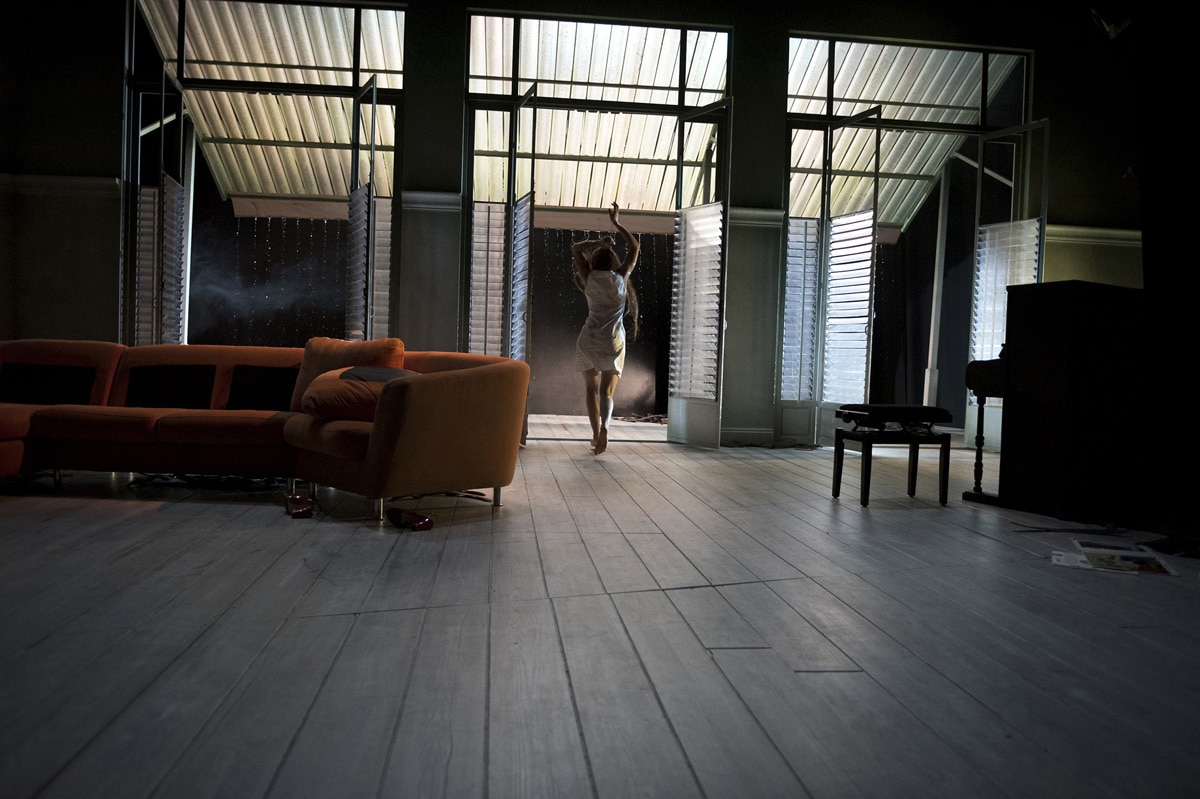Lillian Hellmans The Little Foxes is geen dankbaar stuk om te regisseren of te spelen. Daarvoor is het mensbeeld dat de Amerikaanse (1905-1984) neerzet eenvoudigweg te zwartgallig. Het Nationale Toneel slaagt er in de regie van Antoine Uitdehaag helaas niet in daar voldoende psychologische gelaagdheid in aan te brengen.
In The Little Foxes, in 1941 succesvol verfilmd met Bette Davis in de hoofdrol, schetste Hellman de nieuwe rijken in het zuiden van de Verenigde Staten rond 1900. Onder een dun vernis van familiebanden maken twee broers en een zus uit de familie Hubbard elkaar het leven zuur. Motivatie: louter winstbejag. Zus Regina (Anniek Pheifer) heeft een slecht huwelijk met de aan hartkwalen lijdende bankier Horace Giddens (Pieter van der Sman). Met haar broers Oscar (Jappe Claes) en Ben (Mark Rietman) wil ze investeren in een nieuwe fabriek. Samen hebben ze Horace nodig om geld op tafel te krijgen, maar intussen doen ze niet anders dan elkaar oplichten en chanteren. Wanneer Horace uiteindelijk in een dramatische passage sterft, heeft dat voor broers en zus/echtgenote uitsluitend financiële betekenis.
Gewetenloos neoliberalisme
Antoine Uitdehaag heeft voor dit stuk gekozen vanwege de actualiteit van gewetenloos neoliberalisme. Broer Ben voorspelt de toekomst in zekere zin als hij zegt: ‘Er zitten honderden Hubbards in kamers zoals deze in het hele land. Ze heten niet allemaal Hubbard, maar het zijn allemaal Hubbards en op een dag is het land van hen. Wij komen er wel.’ Het past ook in het thema misbruik en uitbuiting, dat dit jaar als rode draad door de stukken van het Nationale Toneel loopt: misbruik van vertrouwen in De revisor, misbruik van vluchtelingen in De gouden draak.
Maar The Little Foxes schiet door. Een aantal karakters is dusdanig antipathiek dat de vergelijking ongeloofwaardig wordt. Zelfs een linkse rakker zal niet geloven dat de gemiddelde neoliberaal zó door en door slecht is. Sympathie wekken vooral de outsiders in de familie. De adellijke Birdie (Betty Schuurman) is ooit om haar vermogen getrouwd door Oscar, een bekrompen redneck die zijn vrouw vernedert en slaat. Schuurman zet de verwelkende, te veel drinkende Birdie ontwapenend neer. Bankier Horace heeft weliswaar zijn leven lang vuile spelletjes gespeeld, maar wil daar met de dood in zicht niet langer aan meewerken – zeker niet als zijn toegewijde dochter Alexandra (Sallie Harmsen) het slachtoffer lijkt te worden. Van der Sman vertolkt Horace sterk en waardig, al schreeuwt hij soms wel erg krachtig voor een zo zieke man. Bediende Addie (Antoinette Jelgersma) probeert tevergeefs iedereen bijeen te houden.
Het speelt zich allemaal af in een briljant decor van Thomas Rupert, dat alles weerspiegelt waar het stuk voor staat. Ontwrichting: alle vloeren lopen schuin. Het verlangen naar een ander leven: het publiek kijkt vanuit het sombere, zwaargebouwde huis naar buiten. Daarmee delen we in de het opgesloten gevoel van de personages, terwijl het leven achter de openslaande deuren lichter lijkt, zelfs als het regent. Bijna als filmmuziek klinken af en toe onheilspellende fragmenten deltablues.
Bob Dylan
Het is in dit decor dat Sallie Harmsen zorgt voor een ontroerende slotpassage. Waar Alexandra’s moeder heeft willen ontsnappen aan het benauwde zuiden door zo veel mogelijk geld te veroveren, kiest zij voor een ander soort ontsnapping: weg van deze familie, desnoods zonder een cent. Op het pick-upje in de hoek zet ze keihard Bob Dylans Subterranean Homesick Blues op en buitelt woest door de kamer, tuindeuren opengooiend en kussens van de bank smijtend. Het verdriet om haar vader en de opluchting door haar voorgenomen vertrek vinden een gezamenlijke uitweg.
Misschien was deze Dylan-passage de reden voor Uitdehaag om het stuk naar de jaren zestig te verplaatsen? Al het overige – aandelen in de Amerikaanse spoorwegen, gearrangeerde huwelijken tussen neef en nicht, rijk worden in de katoen – doet veel meer denken aan de oorspronkelijk beschreven periode rond 1900. Het was sterker geweest ondubbelzinniger te kiezen voor een van beide tijdvakken. Voor Addies stiekeme dansje met de stofzuiger en het gebruik van de grammofoon waren rond 1900 best alternatieven te verzinnen geweest.
Prins Bernhard-grinnik
Maar dat is niet het grootste mankement aan deze The Little Foxes. Dat ligt in de compromisloze benadering van de wreedheid van de hoofdpersonen. Claes wekt weerzin als agressieve underdog Oscar. Het komische gestuntel van zijn zoon Leo (Bram Suijker) voelt bijna ongepast temidden van alle kwalijke intriges. Mark Rietman charmeert als gewetenloze Ben die zijn troeven met een Prins Bernhard-achtige grinnik uitspeelt, maar ook zijn verlies weet te nemen. Het hardst van allen is Regina. In het begin vertolkt Pheifer haar als weliswaar berekenend, maar soms ook vrolijk en verlangend naar een beter leven. Later in het stuk laat zij haar man sterven zonder hem de gevraagde hulp te bieden om direct daarna, volstrekt emotieloos, een nieuwe onderhandelingsronde met haar broers in te zetten. Die totale onbewogenheid is moeilijk te geloven, zelfs als de dode een gehaat persoon is, en zelfs als diens overlijden kansen schept.
Door het stuk heen verklaren verschillende passages Regina’s karakter: waarom ze weg wil, waarom ze haar man veracht, waarom ze wrok koestert jegens haar broers. Die tragiek komt bij het Nationale Toneel niet over, omdat je tegen het einde niet meer gelooft dat deze vrouw in staat is tot iets anders dan kwaad. Dat maakt het bijna onmogelijk je met nog haar te vereenzelvigen, en zo laat het stuk uiteindelijk weinig meer achter dan een sterk gevoel van onbehagen over de slechtheid van de mens.
The Little Foxes van het Nationale Toneel. Gezien: 17 april 2016. Tournee tot en met 15 juni.

